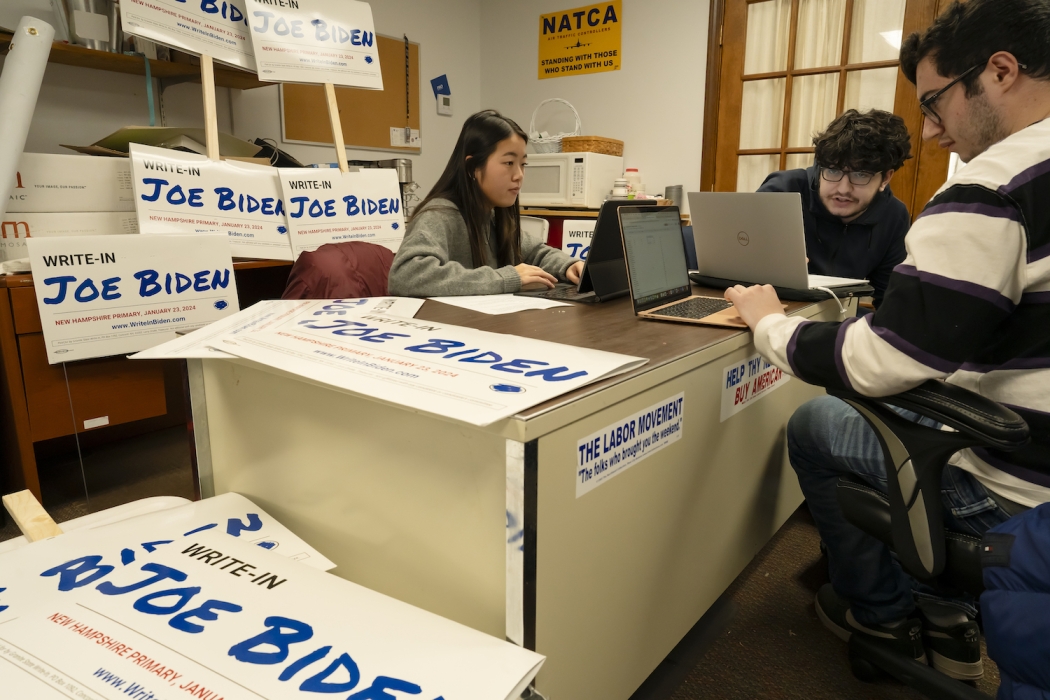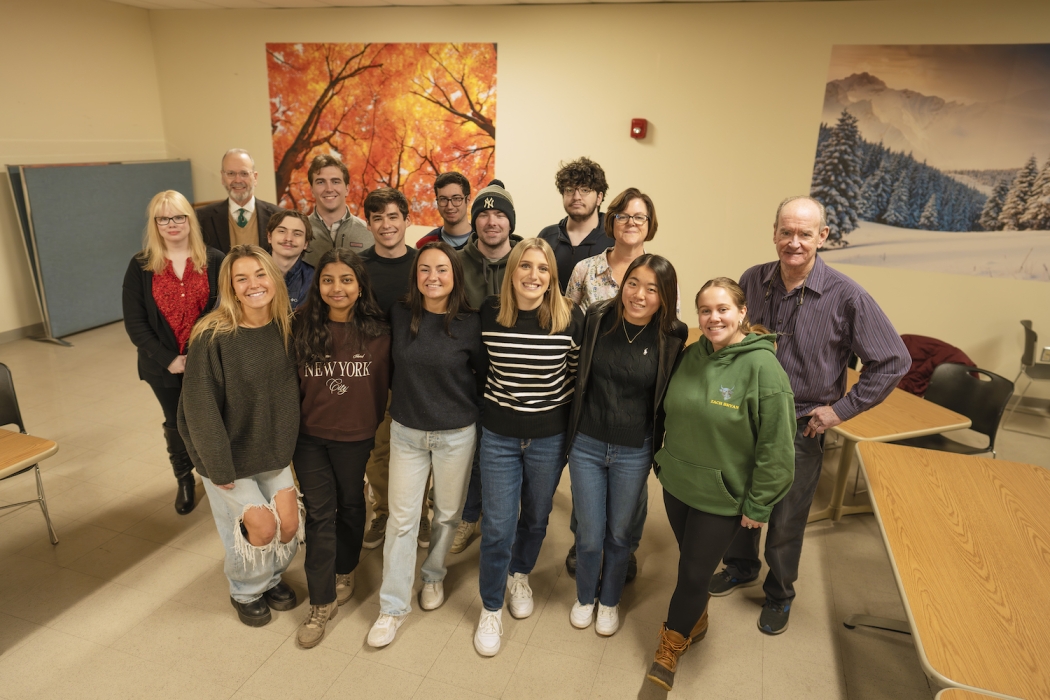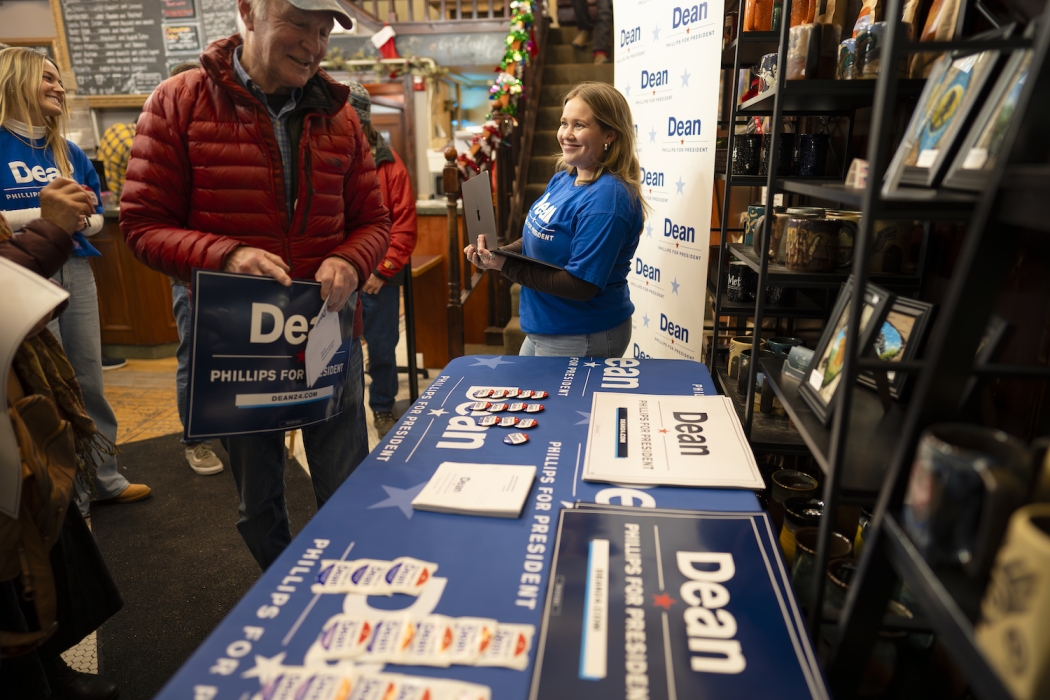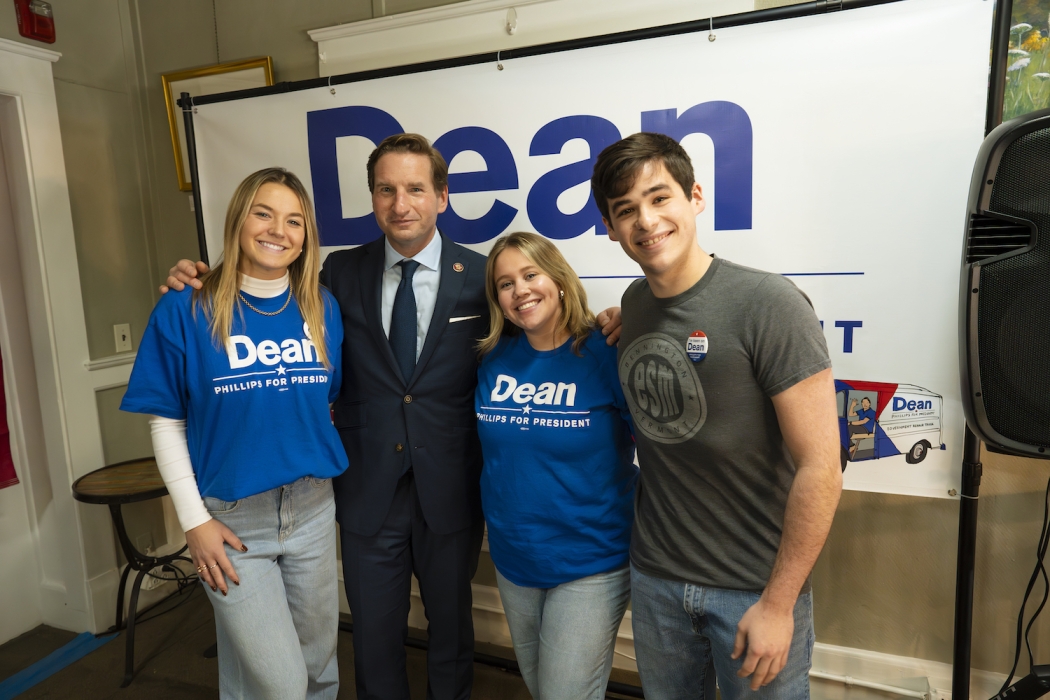
Brooke Fleming '24, Caitlin LeSage '25 and Andrew Jones '25 with Rep. Dean Phillips (D-Minn.), at a meet and greet with the candidate at the Metropolitan Coffee House in North Conway, N.H.
NORTH CONWAY, N.H. --- On a late weekday afternoon, a few dozen people brave the biting winds ricocheting off the White Mountains and file into the Metropolitan Coffee House.
The audience, mainly older and retired folks, have gathered for a meet and greet with Rep. Dean Phillips (D-Minn.), a longshot hoping to win the Granite State’s Democratic presidential primary when voters go to the polls Jan. 23.
Hours before the event, Andrew Jones ’25, Brooke Fleming ’24 and Caitlin LeSage ‘25 had left their hotel back in Manchester and climbed into a Union College van for the 100-mile trip to the venue to help prepare for Phillips’ speech. Inside, they set up tables, check people in and enthusiastically distribute a smattering of the candidate’s swag.
When the hour-long event in the shop’s second-floor space ends, the students work the crowd as the audience descend the stairs.
Wearing a blue “Dean Phillips for President” T-shirt, Fleming, a political science and philosophy major from Andover, Mass., greets a silver-haired man in a red and black plaid checkered coat.
“We appreciate you coming,” she says. “What resonated with you in Dean’s message?”
Fleming is among a dozen students who participated in the New Hampshire Presidential Primary mini-term. For three weeks over winter break in December, the group canvassed the state, attending candidate rallies, volunteering with campaign organizations, and meeting with political and civic leaders who play a role in what, until this year, was the first-in-the-nation primary.
The New Hampshire experience was one of many mini-terms offered over the winter break. Students also studied in places like Argentina; Cordoba, Spain; India; New Zealand; Paris; and South Africa.
A major appeal of the New Hampshire mini-term is its focus on experiential learning. This is the third presidential cycle the College has offered the experience, which is run by Zoe Oxley, the William D. Williams Professor of Political Science. The first was in the run-up to the 2012 Republican presidential primary.
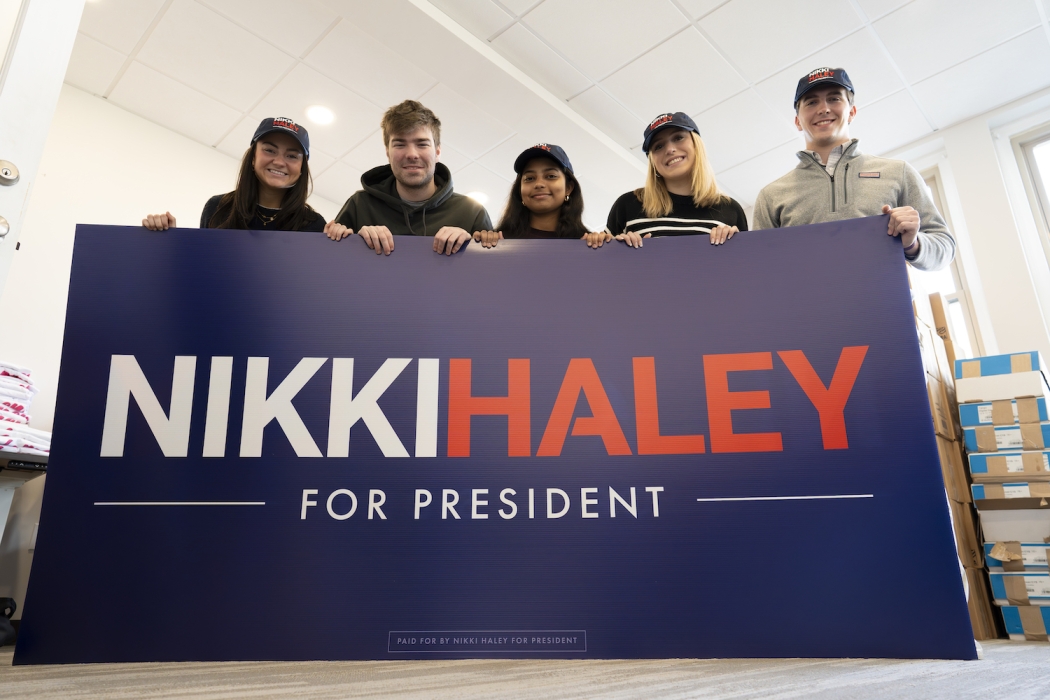
Alison Barrett '24, Robert Trovato '25, Shriya Biswas '26, Mia Raiti '26 and Chris Suter '25, at the campaign office of presidential hopeful Nikki Haley.
A keen supporter of experiential opportunities for students, Oxley was searching for a way to teach students about the presidential nominating process. Cliff Brown, the Robert Porter Patterson Professor of Government, teaches courses on the presidency and on presidential campaigns. Brown, who joined Union in 1978, suggested New Hampshire as a learning laboratory because of its historic focus on endless town halls and retail politics. One could walk down the street in places like Manchester or Concord, the state’s capital, and bump into a candidate for a face-to-face meeting.
Though the dynamics of campaigning in New Hampshire has shifted dramatically since Union’s first mini-term, with less in-person involvement from candidates and more social media and digital campaigning, Oxley managed to create a robust agenda for the 2024 primary cycle.
“Campaigns have changed so much since 2012,” said Oxley. “It’s more likely to involve social media advertising, or what I call campaigning from 30,000 feet and less on-the-ground activity. That made it more of a challenge to find placements in campaigns for our students. The last time, we were involved in five or six campaigns. This year, we only could get three.”
Before heading to New Hampshire, students chose from among the three campaigns that granted access the one they preferred to work on. Their choices didn’t necessarily reflect their political leanings.
Davis O’Brien ’26 joined his three fellow students with the Phillips campaign.
Alison Barrett ‘24, Shriya Biswas ‘26, Mia Raiti ‘26, Christopher Suter ‘25 and Robert Trovato ‘25 assisted with former South Carolina Gov. Nikki Haley’s campaign.
Craig Efrati ‘25, Robert Levitt ‘26 and Melina McGovern ‘26 worked on the unofficial write-in campaign for President Joe Biden. Biden’s name won’t appear on the ballot after the Democratic National Committee decided to bump New Hampshire as the first state in the party’s primary cycle in favor of South Carolina, with its more diverse electorate.
One morning, the Biden group met in a tiny, cramped office of the AFL-CIO in Hooksett to parse voter lists and work the phones. They acknowledged the challenge of working on a write-in campaign, especially for an incumbent, but welcomed the opportunity.
“We have a different message,” said Levitt ’26, a history major from Dobbs Ferry, N.Y. “Biden’s the incumbent and people know who he is, but we sometimes have to explain why he’s not on the ballot. But even though he’s not on the ballot, you have to vote for him because he’s better than everyone else.”
Biswas, a neuroscience and political science major from Calcutta, India, enjoyed working on the Haley campaign. She and the others in her group got to meet their candidate at a town hall on the second day of the mini-term.
“To see a woman competing against all these men is inspiring to me,” said Biswas. “I have appreciated getting to see how the backstage of a campaign works. There is so much hard work. Getting to experience all of it at such a close level has been great.”
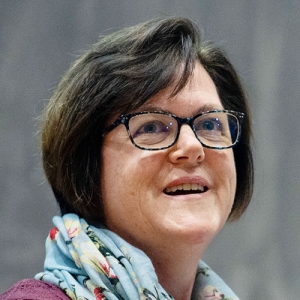
Students weren’t limited to their assigned campaigns. They also attended town halls hosted by Republican candidates Chris Christie, the former New Jersey governor, and tech entrepreneur Vivek Ramaswamy. They even attended what's called the Lesser-Known Candidate Forum, a tradition held by Saint Anselm College in Manchester since 1972. It costs only $1,000 to get your name on the presidential primary ballot in New Hampshire. As a result, the forum featured not only legitimate candidates among the 20 who participated, but also candidates who registered with names like Paperboy Love Prince and Vermin Supreme.
Alison Barrett ‘24, Shriya Biswas ‘26, Mia Raiti ‘26, Christopher Suter ‘25 and Robert Trovato ‘25 assisted with former South Carolina Gov. Nikki Haley’s campaign.
Craig Efrati ‘25, Robert Levitt ‘26 and Melina McGovern ‘26 worked on the unofficial write-in campaign for President Joe Biden. Biden’s name won’t appear on the ballot after the Democratic National Committee decided to bump New Hampshire as the first state in the party’s primary cycle in favor of South Carolina, with its more diverse electorate.
One morning, the Biden group met in a tiny, cramped office of the AFL-CIO in Hooksett to parse voter lists and work the phones. They acknowledged the challenge of working on a write-in campaign, especially for an incumbent, but welcomed the opportunity.
“We have a different message,” said Levitt ’26, a history major from Dobbs Ferry, N.Y. “Biden’s the incumbent and people know who he is, but we sometimes have to explain why he’s not on the ballot. But even though he’s not on the ballot, you have to vote for him because he’s better than everyone else.”
In addition to attending town halls, campaign rallies, watching debates and traditional grunt work like going door-to-door or calling voters, students also found time for related coursework, with the hotel lobby serving as their classroom. There were also field trips, including to the State House in Concord, where they met with state representatives Eric Turer ‘89 and Jim Maggiore. Rep. Paul Terry ’73 was scheduled to be part of the group but had a scheduling conflict.
One afternoon, the group visited the offices of the New Hampshire Union-Leader, the state’s largest newspaper. In a sobering sign of the financial struggles of newspapers, the paper’s flagship building now shares its space with two charter schools and another tenant.
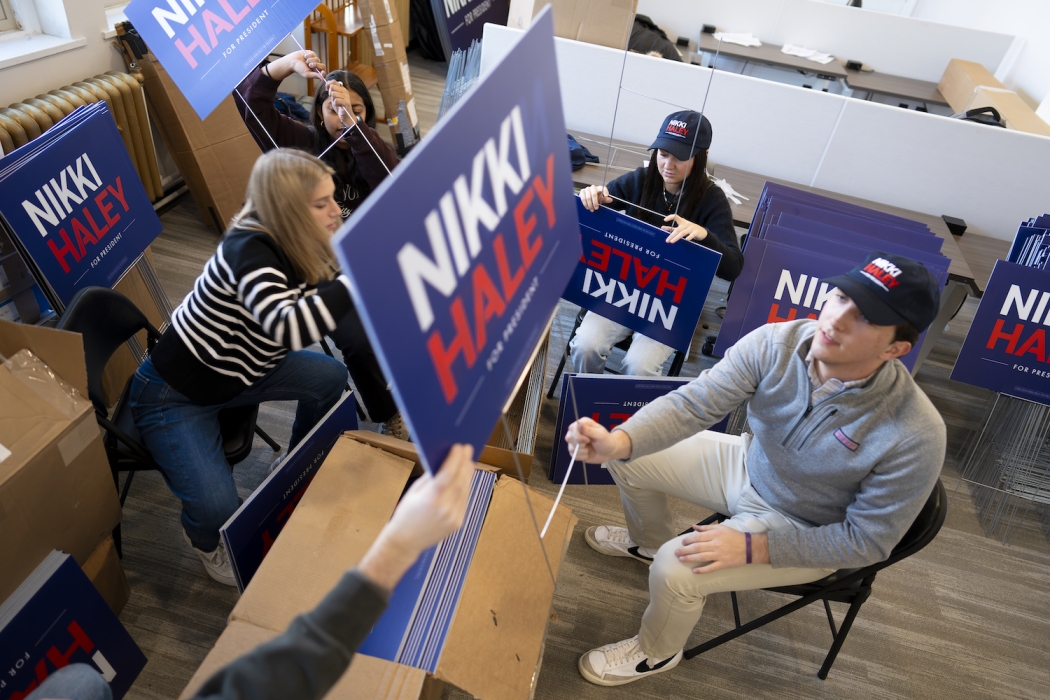
Robert Trovato '25, Mia Raiti '26, Shriya Biswas '26, Alison Barrett '24 and Chris Suter '25 assemble campaign signs at the office of former South Carolina Gov. Nikki Haley.
Kevin Landrigan, the Union-Leader’s statehouse bureau chief, has been covering the primary since 1980. He provided students with an informative and insightful overview of New Hampshire’s role in the nominating process and how it has evolved over the years.
“This is a very different presidential primary than what we are used to,” he told the students assembled in a conference room. Gone are the days of endless town halls and intimate house parties, where voters could simply show up and mingle with candidates, he said. Now, a candidate’s outreach is rooted in digital methods.
“Campaigns now create their events to not meet voters, but rather to build their organization digitally,” said Landrigan, whom Politico has described as an institution in New Hampshire politics. “It wasn’t too long ago that you could walk into any campaign event or show up at a rally to see a candidate. Now it’s mostly by invitation only. They want you to sign up or RSVP. It’s all designed to hook you into their organization. And once they have you, you can’t escape them.”
As the 2024 presidential primary season gets underway and lasts until June, Oxley hopes the breadth and depth offered during the three weeks in New Hampshire gave students a better understanding of the complexity of a presidential campaign.
“I want them to understand what goes into a presidential campaign,” she said. “But also, the history and the process and the structure. I want them to see the big picture of what it takes to win the presidential nomination.”
Students give the New Hampshire Presidential Primary mini-term a solid passing grade. It will be another four years before it is offered again.
“One does not get many opportunities to genuinely get to know someone who is running for president of the United States,” said Fleming. “While I wish more candidates were here for town halls, this has been a great learning experience and a great way to get involved.”
NOTE: Students in the New Hampshire Presidential Primary mini-term will discuss the results of the state’s primary results January 25 during Common Hour in Lippman Hall 017 as part of a Pizza and Politics event.
